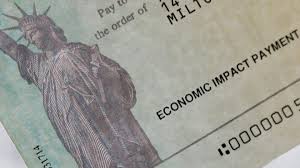Taxpayers across the United States have been eagerly awaiting their tax refunds and tracking their stimulus checks through the Internal Revenue Service cIRSc. With the economic impacts of the COVID-19 pandemic still being felt, many are wondering about the status of potential future stimulus payments.
The stimulus checks issued in response to the pandemic have provided critical financial assistance to individuals and families. The first stimulus check, issued in 2020, provided up to $1,200 for individuals and $2,400 for married couples, with an additional $500 per qualifying child under 17. The second round of stimulus checks, issued in early 2021, provided up to $600 per individual, $1,200 for married couples, and $600 per qualifying child under 17. The most recent round, the third stimulus check, issued in 2021, provided $1,400 per eligible individual, with married couples filing jointly receiving an additional $1,400 for each qualifying dependent.
While these stimulus checks have been a lifeline for many, the deadlines to claim them have passed. The final opportunity to claim the third stimulus check was April 15, 2025. It marked a three-year deadline to claim any tax refunds or the $1,400 Recovery Rebate Credit for 2021. It is crucial for individuals who may be owed these payments to work directly with the IRS or a trusted tax professional to ensure they receive the funds they are entitled to.
Despite rumors circulating on social media and unverified sources suggesting the possibility of a fourth stimulus check, there has been no official confirmation from Congress or the IRS regarding such payments. Individuals should be cautious of misinformation and potential fraudulent schemes related to stimulus payments.
In February, former President Trump mentioned a proposal for distributing $5,000 stimulus checks to taxpayers as a "DOGE dividend." This plan was discussed during a summit in Miami and was framed as a way to return part of the savings identified by Musk's Department of Government Efficiency to taxpayers. However, no concrete plans or legislation have been enacted since this proposal was mentioned.
For those eagerly awaiting their tax refunds, the process of tracking your refund status is relatively straightforward. Taxpayers who have filed their returns can check the status of their refund using the "Where's My Refund?" tool on the IRS.gov website. By entering specific information, such as your Social Security number, filing status, and the exact refund amount, you can track the progress of your refund.
The timeline for receiving your refund depends on how you filed your tax return. Electronic filings are typically processed much faster than paper returns, with the IRS issuing most refunds in less than three weeks. It is important to note that while the IRS aims to process refunds promptly, some returns may require additional review, leading to potential delays.
If you filed your taxes electronically and included your banking information, you can expect a direct deposit within 21 days of your return being accepted. For those awaiting a paper check refund, it may take six to eight weeks to arrive by mail. It is recommended to use the "Where's My Refund" tool to monitor the status of your refund and receive timely updates on its progress.
As individuals navigate the complexities of tax refunds and stimulus check distributions, staying informed and utilizing official IRS resources can help ensure a smooth process. By following the guidelines provided by the IRS and seeking assistance from qualified professionals when needed, taxpayers can effectively track their refunds and any potential stimulus payments they may be owed.

